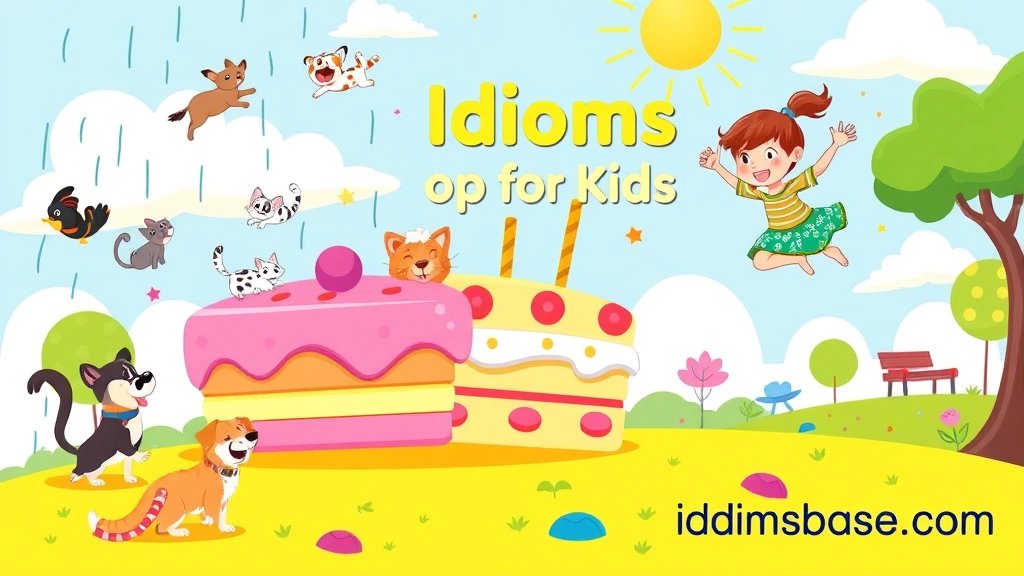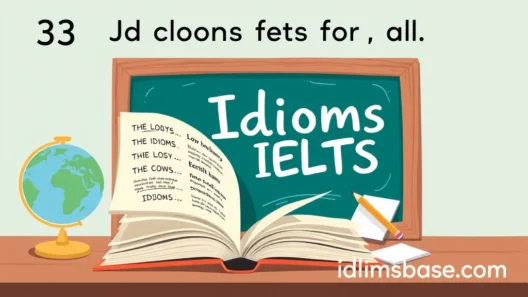Hey there, amazing parents, educators, and curious minds! Have you ever found yourself utterly baffled by a phrase that just doesn't make literal sense? Like, why would someone spill the beans when they're talking about secrets, not actual legumes? Or how can you hit the road without a car, just by leaving? Welcome to the wonderful, wacky world of idioms, where words dance to a different tune!
Idioms are like secret codes in language, adding flavor, humor, and a whole lot of personality to our conversations. They’re phrases where the meaning isn't obvious from the individual words, making them super fun (and sometimes a little tricky) for kids to learn. But imagine trying to explain "raining cats and dogs" to a little one without a visual! That's where the magic of pictures comes in, transforming abstract concepts into concrete, giggle-inducing images.
Learning idioms isn't just about expanding vocabulary; it's about understanding culture, developing critical thinking, and boosting comprehension. It’s like giving your child a superpower to decode the hidden messages in everyday language! And honestly, what’s more delightful than seeing a child’s eyes light up as they finally get why someone calls it a "piece of cake"?
So, buckle up, because we're about to embark on a delightful journey through 35 fantastic idioms, perfectly paired with the idea of "pictures" to make learning an absolute breeze for your little learners. Get ready to sprinkle some linguistic stardust into your family's daily chats!
Why Pictures are a Game-Changer for Learning Idioms
Think about it: our brains are hardwired for visuals. We remember faces, places, and crazy cartoons far better than a list of abstract words. When you introduce idioms with pictures, you're not just teaching a phrase; you're creating a memorable, often humorous, mental image that sticks. It's like turning an English lesson into a fun game of charades!
The Power of Visual Learning
- Enhanced Comprehension: Pictures simplify complex ideas. "Butterflies in my stomach" becomes a literal image of fluttering insects, making the feeling of nervousness suddenly relatable.
- Improved Retention: Our brains link images to concepts, making recall much easier. A funny picture of a cat and dog falling from the sky helps cement "raining cats and dogs" in memory.
- Increased Engagement: Kids are naturally drawn to colorful, imaginative visuals. Learning becomes an exciting adventure rather than a chore.
- Bridging the Abstract-Concrete Gap: Idioms are inherently abstract. Visuals provide a concrete anchor, helping young minds grasp meanings that aren't literal.
Ready to dive into our treasure trove of idioms? Let's go!
35 Idioms for Kids (with Picture-Perfect Explanations!)
Imagine each of these with a super fun, quirky picture illustrating the literal meaning, then a simple explanation of what it really means. It's a recipe for learning success!
Everyday Idioms for Daily Life
These are the ones you'll hear and use all the time!
-
A Piece of Cake
- Literal Picture: A delicious slice of cake.
- Meaning: Something very easy to do.
- Example: "That math problem was a piece of cake!"
-
Raining Cats and Dogs
- Literal Picture: Cats and dogs falling from the sky with umbrellas.
- Meaning: Raining very heavily.
- Example: "Don't forget your umbrella, it's raining cats and dogs out there!"
-
Spill the Beans
- Literal Picture: A person accidentally knocking over a jar of beans.
- Meaning: To reveal a secret.
- Example: "Come on, spill the beans! What's the surprise?"
-
Hit the Road
- Literal Picture: Someone literally hitting a road with a hammer.
- Meaning: To leave or depart.
- Example: "It's getting late, we should hit the road."
-
Bite Your Tongue
- Literal Picture: Someone literally biting their tongue.
- Meaning: To stop yourself from saying something you want to say.
- Example: "I had to bite my tongue to stop myself from laughing."
-
Break a Leg
- Literal Picture: A person with a broken leg.
- Meaning: Good luck! (Often used before a performance).
- Example: "You have a big show tonight, break a leg!"
-
Under the Weather
- Literal Picture: A person standing under clouds, looking sad.
- Meaning: Feeling sick or unwell.
- Example: "I'm feeling a bit under the weather today, I think I have a cold."
-
On Cloud Nine
- Literal Picture: A person floating happily on a cloud.
- Meaning: Extremely happy.
- Example: "She was on cloud nine after winning the competition."

-
Butterflies in My Stomach
- Literal Picture: A person with butterflies flying around in their tummy.
- Meaning: Feeling nervous.
- Example: "I always get butterflies in my stomach before a big presentation."
-
Head in the Clouds
- Literal Picture: A person with their head literally in the clouds.
- Meaning: Daydreaming or not paying attention.
- Example: "He always has his head in the clouds during class."
Animal-Themed Idioms
Animals often pop up in idioms, making them extra fun!
-
Cat Got Your Tongue?
- Literal Picture: A cat holding a tongue.
- Meaning: Why are you so quiet?
- Example: "You're usually so talkative, cat got your tongue?"
-
Let the Cat Out of the Bag
- Literal Picture: A cat crawling out of a bag.
- Meaning: To reveal a secret, usually by accident.
- Example: "Oops, I let the cat out of the bag about the surprise party!"
-
Don't Put All Your Eggs in One Basket
- Literal Picture: A person putting all their eggs into a single, fragile basket.
- Meaning: Don't risk everything on one plan.
- Example: "Make sure you have a backup plan; don't put all your eggs in one basket."
-
Hold Your Horses
- Literal Picture: A person literally holding back horses.
- Meaning: Wait a moment; slow down.
- Example: "Hold your horses! We need to think this through first."
-
A Busy Bee
- Literal Picture: A bee wearing a tiny suit, carrying a briefcase.
- Meaning: Someone who is very active and hardworking.
- Example: "My grandma is such a busy bee, always doing something!"
-
Cry Over Spilled Milk
- Literal Picture: A person crying dramatically over a spilled glass of milk.
- Meaning: To be upset about something that has already happened and can't be changed.
- Example: "It's just a small mistake, no need to cry over spilled milk."
-
Curiosity Killed the Cat
- Literal Picture: A curious cat peeking into a dangerous place.
- Meaning: Being too curious can lead to trouble.
- Example: "Be careful what you ask; curiosity killed the cat!"
-
Go the Extra Mile
- Literal Picture: A person running an extra mile beyond the finish line.
- Meaning: To do more than what is expected.
- Example: "She always goes the extra mile to help her friends."
-
Have a Frog in Your Throat
- Literal Picture: A frog literally sitting in someone's throat.
- Meaning: To have a hoarse voice or difficulty speaking.
- Example: "Excuse me, I have a frog in my throat today."
Food-Related Idioms
Mmm, tasty idioms!
-
Bring Home the Bacon
- Literal Picture: A person carrying home strips of bacon.
- Meaning: To earn money for the family.
- Example: "My parents work hard to bring home the bacon."
-
Couch Potato
- Literal Picture: A potato sitting on a couch, watching TV.
- Meaning: A lazy person who spends a lot of time watching TV.
- Example: "After school, he turns into a couch potato."
-
As Easy as Pie
- Literal Picture: A delicious, perfectly baked pie.
- Meaning: Very easy.
- Example: "Learning to ride a bike was as easy as pie for her."

-
The Apple of My Eye
- Literal Picture: An apple with a single large eye.
- Meaning: Someone or something that is cherished above all others.
- Example: "My granddaughter is the apple of my eye."
-
In a Pickle
- Literal Picture: A person literally stuck inside a pickle jar.
- Meaning: In a difficult situation.
- Example: "We're in a bit of a pickle; we missed the last bus."
-
Sweet Tooth
- Literal Picture: A tooth covered in candy.
- Meaning: A strong liking for sweet foods.
- Example: "I have such a sweet tooth; I can never say no to chocolate."
Weather & Nature Idioms
The world around us inspires many colorful phrases!
-
Every Cloud Has a Silver Lining
- Literal Picture: A dark cloud with a shiny silver edge.
- Meaning: Every difficult situation has a positive side.
- Example: "Even though you lost the game, every cloud has a silver lining; you learned a lot!"
-
A Storm in a Teacup
- Literal Picture: A tiny storm (with lightning and rain) inside a teacup.
- Meaning: A lot of fuss about something minor.
- Example: "Their argument was just a storm in a teacup; they're friends again now."
-
Blink of an Eye
- Literal Picture: A giant eye blinking very quickly.
- Meaning: A very short amount of time.
- Example: "The magician disappeared in the blink of an eye."
-
Out of the Blue
- Literal Picture: Something falling unexpectedly from a clear blue sky.
- Meaning: Unexpectedly; without warning.
- Example: "My old friend called me out of the blue yesterday."
- Green Thumb
- Literal Picture: A person with a thumb that is literally green.
- Meaning: Good at gardening.
- Example: "My aunt has a green thumb; her garden is amazing!"
Action & Character Idioms
These describe what people do or who they are.
-
Bite the Bullet
- Literal Picture: A person literally biting a metal bullet.
- Meaning: To endure a difficult situation.
- Example: "It's going to be tough, but you'll just have to bite the bullet and get through it."
-
Get Cold Feet
- Literal Picture: A person with feet that are literally frozen.
- Meaning: To become nervous or scared about doing something you had planned.
- Example: "He was going to try out for the play, but he got cold feet at the last minute."
-
Hit the Books
- Literal Picture: A person literally hitting books with a bat.
- Meaning: To study hard.
- Example: "I have a big test tomorrow, so I need to hit the books tonight."
-
Keep Your Chin Up
- Literal Picture: A person literally holding their chin up.
- Meaning: Stay cheerful in a difficult situation.
- Example: "Things are tough now, but keep your chin up!"
-
Pull Someone's Leg
- Literal Picture: A person literally pulling someone else's leg.
- Meaning: To playfully tease someone.
- Example: "Don't worry, I'm just pulling your leg, I didn't really spill the juice!"
How to Make Learning Idioms Fun and Effective

Now that you have this fantastic list, how do you really bring these idioms to life for your kids?
Tips for Parents and Educators
- Create Your Own "Idiom Picture Book": Encourage kids to draw their own literal interpretations of idioms. This is a fantastic creative exercise and reinforces learning.
- Idiom Charades: Act out the literal meaning, then the real meaning. Guessing games are always a hit!
- Spot the Idiom: Point out idioms when you hear them in books, movies, or everyday conversations. "Did you hear that? They just used 'piece of cake'!"
- Context is Key: Always explain the idiom in a sentence, and then explain its true meaning.
- Start Small: Don't overwhelm them. Introduce a few idioms at a time until they're comfortable.
- Make it a Game: Turn it into a daily challenge or a weekly idiom quiz.
- Use Flashcards: Create flashcards with the idiom on one side and a picture/explanation on the other.
Frequently Asked Questions about Idioms for Kids
Q1: What is an idiom, and why are they important for kids to learn?
An idiom is a phrase or expression whose meaning cannot be understood from the ordinary meaning of its words. For example, "kick the bucket" doesn't mean to literally kick a bucket; it means to die. They are important for kids to learn because they are a fundamental part of everyday language, especially in English. Understanding idioms helps children:
- Improve reading comprehension: Many books and stories contain idioms.
- Enhance communication skills: They can understand and use richer, more nuanced language.
- Develop critical thinking: It encourages them to think beyond literal meanings.
- Understand cultural nuances: Idioms often reflect cultural values and history.
Q2: At what age should I start teaching idioms to my child?
There's no single "right" age, but generally, children from ages 6-8 (around first or second grade) can begin to grasp the concept of idioms, especially with visual aids. Younger children might enjoy the funny literal interpretations, but understanding the abstract meaning usually develops a bit later. The key is to introduce them naturally and playfully, rather than as a formal lesson.
Q3: How can I make learning idioms fun and engaging for my child?
Making it fun is crucial! Here are some ideas:
- Use pictures and drawings: As highlighted in this article, visuals are incredibly effective.
- Tell stories: Create short, silly stories where idioms are used in context.
- Play games: Idiom charades, Pictionary, or matching games can be very engaging.
- Point them out in daily life: When you hear an idiom on TV, in a book, or in conversation, pause and explain it.
- Encourage creativity: Have them draw their own literal interpretations or write sentences using new idioms.
- Keep it light and positive: Don't pressure them; learning should be an enjoyable discovery.
Q4: Are there any common mistakes kids make when learning idioms?
Yes, the most common mistake is taking idioms literally! This is why pictures of the literal meaning can be so effective and humorous. For example, a child might think "it's raining cats and dogs" means animals are actually falling from the sky. Another common challenge is remembering the abstract meaning, especially since many idioms don't have obvious clues in their words. Consistent exposure and playful reinforcement help overcome these hurdles.
Q5: Can learning idioms help with my child's overall language development?
Absolutely! Learning idioms significantly enriches a child's vocabulary and understanding of language. It helps them:
- Grasp figurative language: This skill transfers to understanding metaphors, similes, and other literary devices.
- Improve listening skills: They learn to listen for context clues.
- Boost creative writing: They can incorporate these colorful phrases into their own stories.
- Enhance social communication: They can better understand jokes, sarcasm, and nuanced conversations.
It's a fantastic way to deepen their appreciation and mastery of the English language!
Key Takeaways
- Idioms are fun, non-literal phrases that add color and depth to language.
- Visuals are incredibly powerful for teaching idioms to kids, making abstract concepts concrete and memorable.
- Start early and make it playful: Introduce idioms around ages 6-8 with games and activities.
- Context is king: Always explain idioms within sentences and real-life situations.
- Learning idioms boosts overall language skills: Improves comprehension, vocabulary, critical thinking, and cultural understanding.
- Don't be afraid to be silly! The more fun you have with it, the more your child will learn and remember.
So, there you have it! A fantastic collection of idioms, ready to be brought to life with imaginative pictures and lively explanations. We hope this guide helps you unlock the fascinating world of idioms for the young learners in your life. What's your favorite idiom to teach? Share your thoughts and let's keep the conversation going! Happy idiom hunting!






